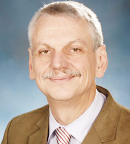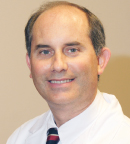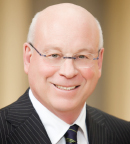THE AMERICAN SOCIETY FOR RADIATION ONCOLOGY (ASTRO) has announced the 2017 ASTRO Gold Medalists. Søren M. Bentzen, DSc, PhD; Louis B. Harrison, MD, FASTRO; and Michael L. Steinberg, MD, FASTRO, have been awarded the annual honor given to ASTRO members who have made outstanding lifetime contributions in the field of radiation oncology. They will be recognized for their achievements at an awards ceremony during ASTRO’s 59th Annual Meeting in San Diego, taking place September 24–27, 2017. In the award’s 41st consecutive year, the new awardees join an exclusive class of 81 Gold Medalists selected over the decades from the Society’s more than 10,000 members.

Søren M. Bentzen, DSc, PhD
Søren M. Bentzen, DSc, PhD
DR. BENTZEN is currently Professor and Director of the Division of Biostatistics and Bioinformatics in the Department of Epidemiology and Public Health at the University of Maryland School of Medicine in Baltimore. He holds a secondary faculty appointment there as Professor of Radiation Oncology and is a member of the University of Maryland Marlene and Stewart Greenebaum Comprehensive Cancer Center as well.
After earning his doctorate in medicine and medical physics from the University of Aarhus in Denmark, Dr. Bentzen was a visiting scientist at The University of Texas MD Anderson Cancer Center. From there, he held appointments at the University of Aarhus, the Gray Laboratory, and the University of Wisconsin, before taking the post at the University of Maryland.
“I came into this field at a great time,” said Dr. Bentzen. “Radiation therapy has undergone quite a renaissance. The progress we’ve made in understanding radiation biology and molecular cancer biology has revolutionized the way radiation oncology is practiced.”
Indeed, Dr. Bentzen has played a large role in that understanding. For years, he has studied the long-term effects of normal tissue toxicity as a result of radiation treatment. According to one nominating letter, “Søren’s work on normal tissue injury is probably the most important work of this type in the radiation oncology literature.” This work led him to consider dose-fractionation schedules and how radiation therapy might be best tailored to maximize tumor control while minimizing toxicity to normal tissue.
Dr. Bentzen is now focusing on a new frontier of cancer care: personalized medicine using big data to better tailor treatments. He said: “At the end of the day, it’s about optimizing the treatment for each individual. There are so many new possibilities that we didn’t have 15 years ago. With population-level registry data and electronic health records, and then with what we know about genomics—combining data and knowledge across all of those fields is challenging and also very exciting.”

Louis B. Harrison, MD, FASTRO
Louis B. Harrison, MD, FASTRO
FROM DEVELOPING a customized high–dose-rate radiation therapy applicator to writing a textbook to leading multidisciplinary teams, Dr. Harrison’s accomplishments in the field are varied and far-reaching.
He began his medical career in surgery, receiving the Clarence Dennis Society Prize for Surgical Scholarship at the State University of New York (SUNY) Downstate College of Medicine. But he soon switched paths to radiation oncology, saying, “I thought radiation oncology had the best opportunity for curing cancer while optimizing functional outcome and quality of life.”
His surgical background has proven effective for forging partnerships with clinicians across all oncologic specialties. As more people see the value in multidisciplinary cancer care, Dr. Harrison gladly welcomes them to the club—he has been a leader in comprehensive cancer care for decades.
“Radiation oncology is one of those specialties that mixes strongly with many other areas—surgery, medical oncology, imaging, pathology, genomics, immunology, biology, mathematics— but none of us can cure cancer by ourselves,” stated Dr. Harrison.
From 1999 to 2014, he served as Physician-in-Chief of Continuum Cancer Centers of New York and was instrumental in developing multidisciplinary programs across all cancer sites in the Continuum health-care system. Dr. Harrison’s desire to treat cancer while preserving function led him to specialize in head and neck and skin cancers. He was one of the first investigators to combine concomitant chemotherapy with radiation therapy for head and neck cancer, now a standard of care. Along with Lowell Anderson, DSc, and Felix Mick, Dr. Harrison created the Harrison Anderson Mick (HAM) Applicator, a medical device used to deliver high–dose-rate brachytherapy or high–dose-rate intraoperative radiation treatments.
Dr. Harrison was on the Board of Directors of ASTRO from 2005 to 2009. As President and Chair, he advocated for a name change for the Society to stress the importance of cancer care to its members. At ASTRO’s 50th Annual Meeting in September 2008, the membership voted to change its name from the American Society for Therapeutic Radiology and Oncology to its current name, the American Society for Radiation Oncology.
After spending most of his career in New York, Dr. Harrison joined the H. Lee Moffitt Cancer Center and Research Institute in Tampa, Florida, in 2014. He serves Moffitt as Chair of Radiation Oncology as well as Deputy Physician-in-Chief.

Michael L. Steinberg, MD, FASTRO
Michael L. Steinberg, MD, FASTRO
“FOR ME, this award celebrates the incredible advances we have achieved in radiation oncology and cancer treatment but also underscores the continued need to combine clinical research with effective health policy to best provide our patients with state-of-the-art care,” said Dr. Steinberg.
Following his graduation from the University of Southern California School of Medicine, Dr. Steinberg completed a postgraduate year in surgery at Los Angeles County–USC Medical Center, before entering the radiation oncology residency and fellowship program at the University of California, Los Angeles (UCLA).
In the early years of his private medical practice, Dr. Steinberg developed expertise in health-care economics and health policy through teaching and working in health services research at UCLA and the Rand Corporation. He was tapped to serve as a representative to the Relative Value Update Committee for ASTRO from 1997 to 2002 and as the radiation oncology representative to the CPT Editorial Committee from 2002 to 2010.
Dr. Steinberg understood and foresaw the increasing demands of managing health-care economic issues for the specialty of radiation oncology. “This is not just about billing; this is also about access to radiation oncology care and the quality of that care,” Dr. Steinberg would say. In 2002, the Health Policy Council was formed as part of the reorganization of ASTRO governance. Dr. Steinberg was subsequently elected to the ASTRO Board of Directors as the inaugural Chair of the Health Policy Council, from 2003 to 2007.
In 2008, Dr. Steinberg’s career took a turn when he left community practice to become Professor and Chair of the Department of Radiation Oncology for the David Geffen School of Medicine at UCLA, a post he still holds.
In 2010, Dr. Steinberg was elected to the presidential track of ASTRO. In addition to his advocacy for the specialty of radiation oncology on Capitol Hill and with the Centers for Medicare and Medicaid Services, Dr. Steinberg introduced the notion of the Value Proposition in health-care for radiation oncology. He also led ASTRO Board initiatives such as “Choosing Wisely” and the RO-ILS: Radiation Oncology Incident Learning System®. ■

